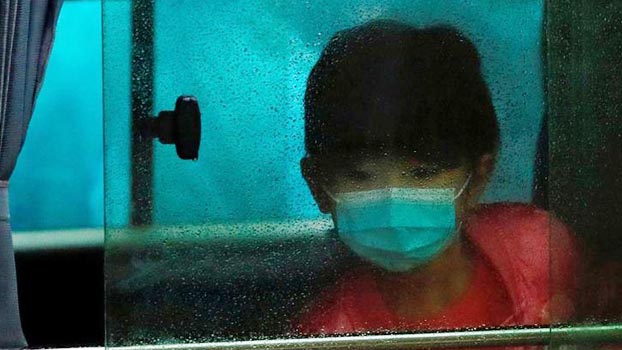Coronavirus is a growing pandemic
It’s been a month since Covid-19 spread from a market in Wuhan to become a global threat


When more than a billion Chinese gathered to celebrate their New Year in late January, no one had ever heard of Covid-19. And while public health officials in Wuhan were imposing strict quarantine measures, shutting down the city and prolonging the celebrations for the Year of the Rat, no one had any idea that in just five weeks, the coronavirus would have spread to four continents, killed almost 3,000 worldwide and infected thousands.
Covid-19 has rapidly spread in part of Asia, Europe, the Middle East even as the number of fresh cases and deaths decline at the disease epicentre in China itself. And on Tuesday, senior officials at the World Health Organisation expressed concern that many nations would be incapable of stopping the spread of Covid-19 as it officially becomes a pandemic.
According to data released by the Chinese Centre for Disease Control and Prevention Covid-19 killed 2.3 per cent of patients infected — making it 23 times more fatal than seasonal flu. That’s why health officials are worried. It’s hard to contain, hard to treat and simply overwhelms your body.
Covid-19 is also associated with elevated levels in
liver enzymes, a lower white blood cell count and
low blood pressure. Some patients also suffered from
acute kidney failure and cardiac arrest
It begins and ends in your lungs and, just like regular flu, coronaviruses are respiratory diseases, spread in microscopic droplets when an infected person sneezes of coughs. Any one in close contact can be infected — and those hacked-up droplets stick to surfaces waiting to contaminate others.
Three phases of attack
You’ll start out with flu-like symptoms of a cough and fever that steadily progresses to pneumonia or worse. And as WHO already knows from studying how SARS spread in 2003, coronaviruses attack the lungs in three phases. There’s viral replication, that sends your immune system into overdrive — “immune hyper-reactivity” the experts call it — and then pulmonary destruction: in plain speak, your lungs lose their ability, permanently, to allow you to breathe. Covid-19 causes milder symptoms in 82 per cent of cases. The rest? The symptoms are severe. Or critical.
According to the experts, in its early stages of infecting you, Covid-19 will take on your lung cells that produce mucus. While mucus is gross outside your body, inside it protects lung tissue from diseases and ensures your lungs don’t dry out. You also have cilia cells — ever so much like little hairs — that beat around the mucus and helping to expel things like pollen or viruses.
But Covid-19 is nasty in that it targets those cilia cells, meaning mucus can’t do its job, is overwhelmed and pneumonia quickly develops in both lungs. That’s just phase one, the viral replication stage. Along then comes phase two. Our body’s natural immune system defences kick into high gear.
Hyper-activity
That’s when phase two and the immune system kicks in — the immune hyper-reactivity stage. In an effort to get rid of this viral invader, the body steps up its fight and floods the lungs with immune cells to get rid of the damage and repair the damaged lung tissue. Normally, the system works and only fights infected areas.
But in cases of Covid-19 and other viruses like SARS or MERs, the immune system in simply inundated and reacts by destroying everything — even healthy tissue. And that means even more stuff building up in your lungs and the pneumonia gets worse.
Then there’s the third phase to look forward to — the pulmonary destruction. The lungs are permanently damaged, most often scarred with lesions just like in severe cases of tuberculosis. Death might even be a relief at that stage. Certainly you’ll be on a ventilator to help you breathe. You are drowning in your own body’s fluid.
And while all of this is going on, Covid-19 and other coronaviruses will also swell the membranes between the air sacs and your blood vessels — meaning the fluid in your lungs affects your ability to circulate oxygen-rich blood around your body too.
High risk
Then it’s at work in your gut. Both SARS and MERS accessed the cells that line your large and small intestines. The jury is out on whether Covid-19 does the same, but about a quarter of those infected have developed severe diarrhoea too.
Covid-19 is also associated with elevated levels in liver enzymes, a lower white blood cell count and low blood pressure. Some patients also suffered from acute kidney failure and cardiac arrest.
By anyone’s standards, Covid-19 is very dangerous indeed. At WHO’s headquarters in Geneva, Bruce Aylward, who headed an international expert mission to China, hailed the drastic quarantine and containment measures taken by the country.
Nations in denial
But he told reporters that other nations were “simply not ready” to contain the outbreak. “You have to be ready to manage this at a larger scale … and it has to be done fast,” Aylward said.
The virus has killed 2,715 people and infected over 78,000 in China. There have been were 52 more deaths reported worldwide by Wednesday. The number of fatalities is the lowest in three weeks and none were outside the epicentre in central Hubei province.
In the rest of the world, there have been more than 40 deaths and 2,700 cases, and the disease has now reached dozens of countries, with Austria, Croatia, Switzerland and Pakistan the latest to declare cases.
The epidemic’s disruption has also grown, with stock markets tumbling around the world, restrictions imposed on travellers and sporting events cancelled. And with the way Covid-19 attacks the body, who can blame organisers for calling off such gatherings. Already there are rumblings the Tokyo Olympics may be put off. Only time will tell.
Mick O’Reilly is Foreign Correspondent at Gulf News. Source: Gulf News



